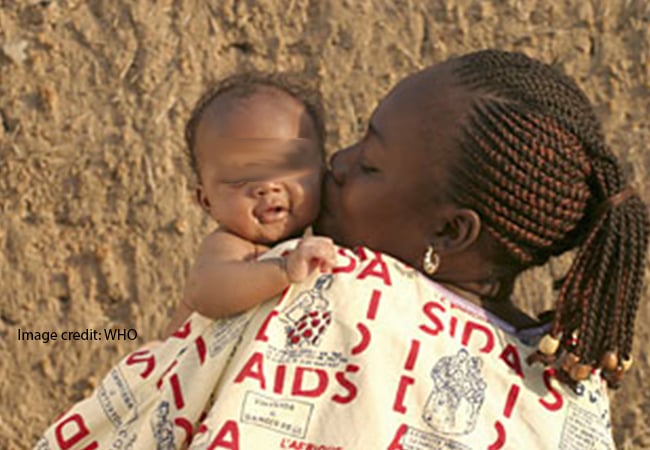
Angela Onwuzoo
Medical experts have blamed the alarming rate of babies born with HIV in Nigeria on the lack of access to HIV testing by pregnant women during antenatal care.
The experts said it is important for pregnant women to access HIV testing, adding that those who test positive must be placed on treatment and encouraged to deliver in certified health facilities for early infant diagnosis services.
They also identified low antenatal uptake and low delivery in certified health facilities by mothers as other reasons responsible for HIV in infants.
The Joint United Nations Programme on HIV and AIDS in a recent report, noted Nigeria still has the world’s highest number of HIV-positive babies with one in seven infants testing positive.
Worse still, the National AIDS/STIs Control Programme says only 57,280 out of the estimated 150,000 children living with HIV in Nigeria were on treatment as of June 2021, thereby making them susceptible to other diseases like tuberculosis or full-blown AIDS.
Speaking exclusively with Reportr Door Healthwise, a medical researcher, Dr. Dan Onwujekwe, explained that HIV could be transmitted from an infected mother to her child during pregnancy, childbirth and breastfeeding if treatment is not started on time.
The retired Chief Research Fellow at the Nigerian Institute of Medical Research, Yaba Lagos, said it is also compulsory to test all pregnant women who show up in an antenatal clinic for HIV, stressing that it helps in the prevention of motor-to-child transmission
He said, “If we can provide antenatal care to every pregnant woman and during the antenatal care we offer them HIV testing, we would be able to detect those who are HIV positive and put them on treatment.
“And if they are treated three to six months before they deliver, it is likely they will not transmit HIV infection to their babies.
“But we have so many babies being born with HIV in Nigeria because their mothers were not tested during pregnancy. There is a treatment for the mothers.
“If pregnant women access antenatal care, those who are HIV positive would be discovered during screening and placed on treatment.”
According to data from the United Nations Children’s Fund, in Nigeria alone, about 22,000 new HIV infections occurred in children aged 0-14 years in 2019.
A 2021 report by the National Agency for the Control of AIDS titled, ‘Estimating modes of HIV transmission in Nigeria’, showed that newborns account for at least 22 per cent of new HIV infections in Nigeria
It read in part, “New child infections due to mother-to-child transmission represent the second source of new infections accounting for 22 per cent of all new infections. In many states, the contribution is even larger.”
The report added that the PMTCT programme, which could stop HIV-positive pregnant women from passing down the virus to their offspring, had not been as effective as it should be as only 50 to 60 per cent of pregnant women actually get antenatal care.
While still blaming the burden of children living with HIV in Nigeria on poor HIV testing of pregnant women during ANC, Onwujekwe said, “We have a very high number of paediatric HIV, that is, children born with HIV. This shows that their mothers were not tested in pregnancy.
“That means they were not accessing antenatal care because if they were accessing antenatal care, the mothers would have been discovered and they would have been placed on treatment.
“We still have a lot of work to do since we still have a lot of paediatric HIV cases. The big challenge is to identify these babies who are likely to be born with HIV infection before they are born.”
The HIV expert decried the lack of adequately trained personnel to deliver HIV services.
He called for the training of traditional birth attendants in HIV management, adding that pregnant women patronising them should have access to HIV testing to further prevent mother-to-child transmission of HIV.
“We need to have a mobile HIV monitoring and management team that can reach many TBAs and communities to deliver these services. They should be properly remunerated. If we can do that, no child will be born with HIV in Nigeria. And that is a window of opportunity we must try to invest in,” he added.
Also, another medical expert, Dr. Olugbenga Ijaodola, said many babies are HIV positive because their mothers had no access to care and were not on treatment before childbirth babies.
Harping on the importance of ANC, Ijaodola who is an Assistant Director, National Prevention of Mother-To-Child Transmission at the Federal Ministry of Health said, “This will ensure that HIV-positive babies are identified on time and treated.”
He expressed concern that despite putting in place proven medical interventions to prevent mother-to-child transmission, many children are still born with HIV annually, adding that a large number of the babies contracted the virus because their mothers failed to access health facilities for antenatal care
According to the World Health Organisation, testing and counselling for HIV should be considered a routine component of the package of care for pregnant women in all antenatal care settings.
The global health body emphasises that testing during ANC helps in the prevention of mother-to-child transmission of HIV.
It says the availability of HIV testing at ANC services is responsible for the high level of knowledge of HIV status among women in many countries, which has allowed women and infants to benefit from ART.
Copyright Reportr Door
All rights reserved. This material, and other digital content on this website, may not be reproduced, published, broadcast, rewritten or redistributed in whole or in part without prior express written permission from Reportr Door.
Contact: [email protected]




